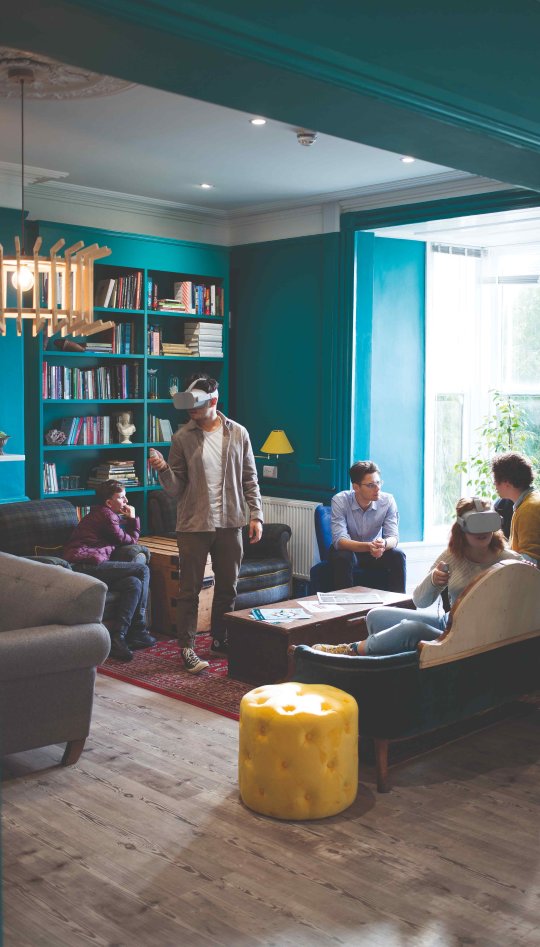
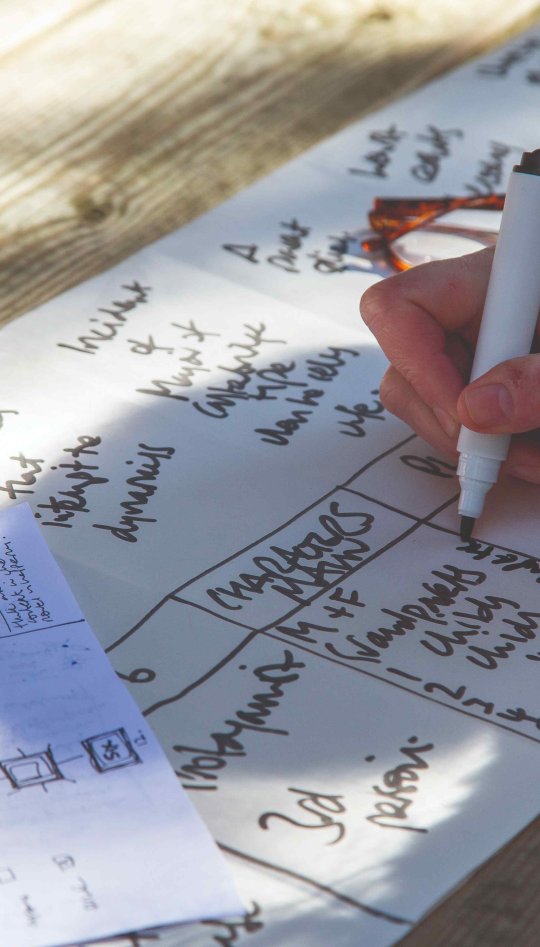
Creative Writing BA(Hons)
Experiment with all forms of writing to develop your writing voice.
Course overview
Do you dream of writing for page, stage or screen? On this Creative Writing BA(Hons), you’ll be encouraged to experiment with all written forms and genres, exploring non-fiction, fiction, poetry, children’s literature and writing for digital games. By analysing the most vital contemporary writing within the context of a rich literary, historical and theoretical past, you’ll develop your authentic voice and can specialise to maximise your creative potential. You’ll learn to draft, edit and pitch your work, graduating with a powerful creative writing portfolio and a wealth of industry contacts.
You will:
- Produce illustrated anthologies, organise mini-festivals or work with a business as part of a collaborative project
- Attend our guest lecture series, where you’ll have the chance to build contacts within all facets of the literary world
- Have the opportunity to attend and participate in literary events such as Falmouth Book Festival and the North Cornwall Book Festival
- Take inspiration from The Lighthouse – the glorious workspace at the heart of our community – which hosts everything from skills and craft workshops to board game sessions, literary quizzes and poetry readings
- Use the stunning natural surroundings as inspiration for the writing process
- Contribute to a vibrant, thriving writing community through FalWriting, our student-led online magazine, or by reading your work at our literary evenings
Course details
On this Creative Writing degree, you'll have the opportunity to gain a BA(Hons) degree over three years or study Creative Writing BA(Hons) with a professional placement year option.
This Creative Writing degree seeks to capture and analyse the most vital contemporary writing (across all formats and media) within the context of a rich literary, historical and theoretical past.
You'll learn, debate and create literary work under the guidance of industry professionals, whether in The Lighthouse, our state-of-the-art campus facilities, or any of our immediate and beautiful natural spaces.
By customising your learning journey you will fully maximise your creative potential. Find your writing voice and focus on your strengths. Make personal connections with industry and community partners through collaborative projects, which will springboard your professional journey from university to your desired industry.
The first year of the degree gives you a grounding in the basics of creative writing, english literature and publishing – all key areas for aspiring writers to be familiar with. But along with the introduction you need, this Creative Writing BA also challenges and breaks the norms of most creative writing degrees with modules like Exploding the Canon: Writing Then and Now and Breaking the Rules: Remix and Writing Back. Each week, you'll have a mix of lectures, workshops and tutorials.
Modules
Writing: Craft and Contexts
Writing: Craft and Contexts explores the practice of writing as a discipline and a craft and asks you to debate ideas about writing, authorship, genre, creativity and audience.
Breaking the Rules: Remix and Writing Back
A challenging, radical and 'breaking the rules' creative writing module, which covers remix and writing back in theory and practice.
Exploding the Canon: Writing Then & Now
How do the literatures of the past infuse the fictions of the present and what do these literatures reveal about us as we are now and us as we once were?
Literatures of Revolution
From the revolutionary ideas of Darwin's theories of evolution to postcolonial revelations, LGBTQI+ movements and the #MeToo phenomena, literature and other textual forms reflect and create society. How do contemporary notions revolutionise texts and how do texts inform revolutionary ideas?
Publishing Cultures
In this module, you'll encounter publishing as a literary and cultural tradition that is dynamic and in a constant state of flux. You will consider the role of technology on the production and dissemination of written texts in the contemporary world.
Publishing Studio: Technologizing the Word
A practical and intermedia publishing module, which might include book design, zine making, performance and exhibition as publication and screen-based media.
Your second year is all about narrowing down to your specialisation, building on two core modules on working as a writer and a collaborative project. You’ll then be able to branch out into different creative writing types to hone your skills in your optional modules.
Your core modules will explore how to plan a project, pitch it and creating your professional writing profile, alongside delivering a dynamic collaborative project with your peers.
The optional modules in year two will give you the opportunity to grow your writing abilities in different specialisms including: writing for games, screenwriting, poetry, creative non-fiction and writing for radio or theatre. You’ll then hone your creative, analytical, critiquing and writing skills and learn how to research, plan, pitch and build a professional profile.
Modules
Writing Project: Making Your Voice Heard
Cut through the noise: get the skills you need in researching, planning, pitching, building a profile or performing resistant alternatives to work as a writer.
Collaborative Project
In this module you'll consider the writer's role as part of a creative eco-system, and/or literature's role in the creative economy through working on a live collaborative project. The project can be a placement in the writing-related industries, a case study or live brief with a business (for example, literary festivals, creative agencies, publishing houses, the heritage sector), or a collaborative project with peers culminating in an event performance or piece of creative practice.
Optional modules
Screenwriting
Poetry
Games
Satire & Scandal
Fiction
Creative Non-Fiction
Radio & Theatre
Magic and the Impossible
You can choose to take an optional professional placement after your second year on a three-year programme.
You’ll be responsible for finding your own placement, with support from the employability team.
Choosing this option will enhance your industry experience and skills while studying.
How you’ll study during your professional placement
You’ll spend time working in a professional context, as part of a business or organisation. This can be in one role, or up to three, and must be for a minimum of 24 weeks.
You’ll develop in-demand workplace skills, deepen your insight into industry and grow your network of contacts, all of which could help you get ahead in your career after graduation.
Throughout this year, you’ll develop a portfolio of work that includes critical self-reflection on what has been learned from the experience. You’ll be required to evidence your experiences, the skills you’ve learned and your professional growth.
Harnessing the knowledge and skills you’ve honed throughout your Creative Writing degree, in your final year you’ll work on a dissertation and portfolio, allowing you to create a critical and sustained piece of work. For these projects, you’ll have weekly tutorials with your supervisor, giving you a close focus on your own writing. You’ll work on live briefs that cover a range of post digital writing, preparing you for working as a writer after graduation.
You’ll also choose from optional modules during the year, and you’ll study a module in experimentation and adaptation.
Modules
Portfolio
You'll write an independent extended piece of creative writing or collection of creative pieces in a genre, form, topic of your choosing.
Experiment and Adaption
Engage with some of the limits of textuality, testing the boundaries of understanding, meaning and communication. By looking at how texts can be remediated, how they morph and repeat, you'll analyse how texts sit within the time and place of their production, but also how they can innovate and shift.
Post-Digital Content
Working closely with live, department-based digital media projects such as FalWriting, you'll get to experience what it's like to be an industry-quality practitioner.
Optional modules
Beyond Humans: Writing in the Anthropocene
Crime & Dark Fiction
Children & Young Adult
Innovations
As part of our process of continuous improvement, we routinely review course content to ensure that all our students benefit from a high-quality and rewarding academic experience. As such, there may be some changes made to your course which are not immediately reflected in the content displayed on our website. Any students affected will be informed of any changes made directly.
From module information to course aims and assessment criteria, discover the full course details:
Prussia Cove inspires students on weekend writing retreat
Third-year students on our undergraduate writing and journalism courses recently gathered at Prussia Cove for a weekend writing retreat.
The group took part in an array of workshops, walks and writing sessions led by lecturers from across Falmouth’s School of Communication. Discover more about the writing retreat.
"....involving students in collaborations is one of the best things about [..] a multi-arts university. It gives them valuable experience of working on high-profile projects..."
- Tom Scott, lecturer
Stories from our community
Explore student projects, graduate successes, staff news and industry insights
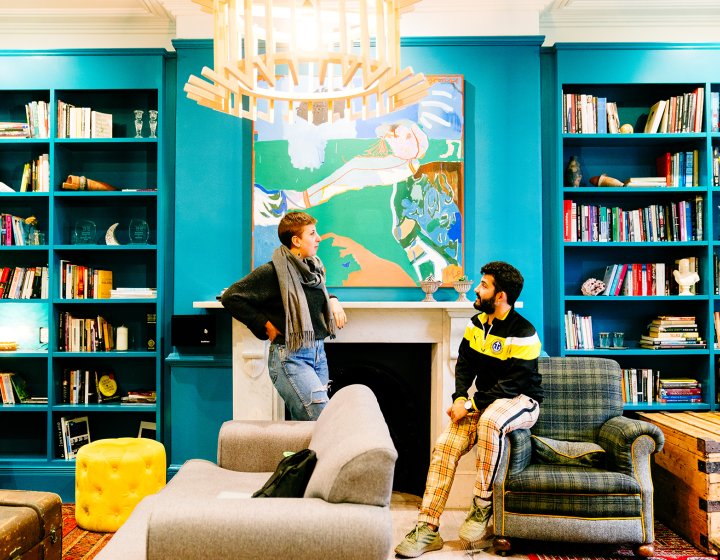
Why I ended up studying Creative Writing at Falmouth University
28 May 2025
When I found the Creative Writing course at Falmouth, I selected it as my top choice pretty quickly,...
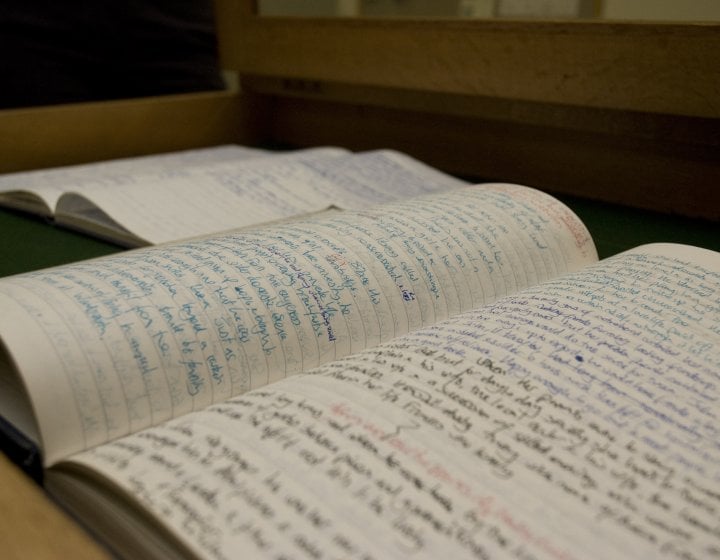
Why I chose to study Creative Writing online
04 June 2025
Hey and welcome! My name is Belle, and I'm a Creative Writing BA (Online) student at Falmouth Univer...

Journalism & Creative Writing student lands internship with local content studio
04 June 2025
Journalism & Creative Writing BA(Hons) student Amal Brepotra is about to embark on a summer internsh...
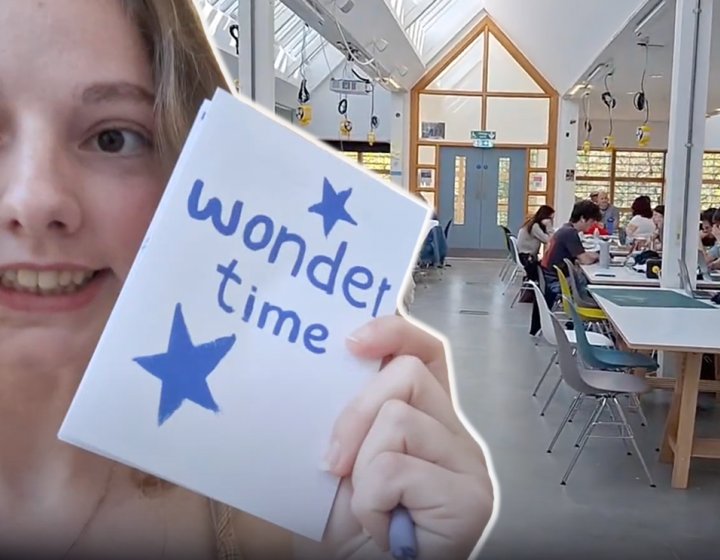
A day in the studio as a Graphic Design student
27 May 2025
Follow second-year Graphic Design student, Ella, as she spends a day in the studio.

Online students join forces on new creative business
23 May 2025
Online students Jaclyn Fielden and Shelley Dunbar have created a new business partnership while work...

Creative Writing course leader organises conference on creativity and neurodivergence
20 May 2025
Dr Marshall Moore, course leader of Falmouth’s online Creative Writing degree, is part of a panel ...

Graduate named in DMG Media’s ‘40 Under 40’ young marketing stars
20 May 2025
Marketing and Digital Communications MA (Online) graduate Andie Cooper is at the forefront of market...

Professional Writing MA alumna set to release debut novel with HarperCollins imprint
15 May 2025
After writing freelance for Devon Life, BBC Countryfile Magazine, and as a host blogger for The Huff...
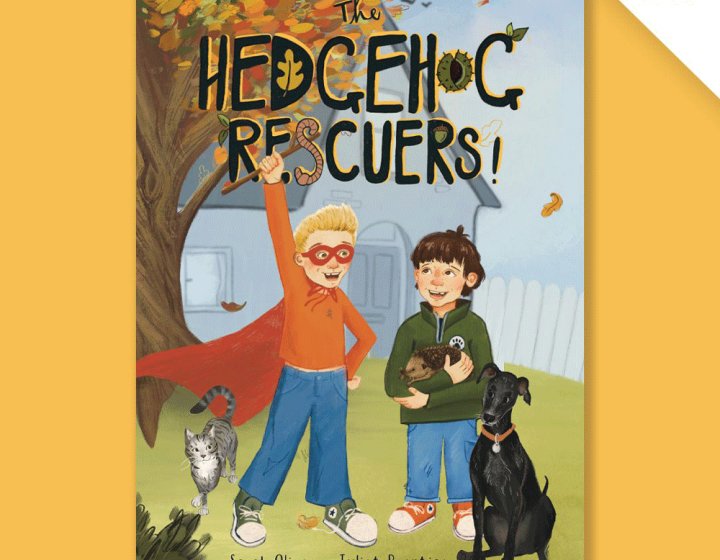
Falmouth graduates collaborate to secure 5 book deal with children's publisher
12 May 2025
Since graduating, Sarah Oliver has gone on to become a Sunday Times bestselling author, publishing o...
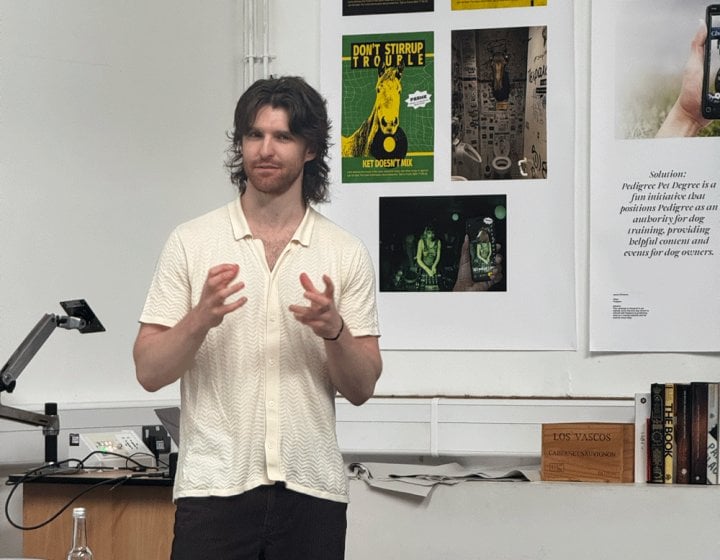
“Your job is to bring the sparkle”: Creative Advertising alumnus gives students advice
06 May 2025
Since graduating in 2020, Jonah Campbell has worked on everything from television adverts for Burt...
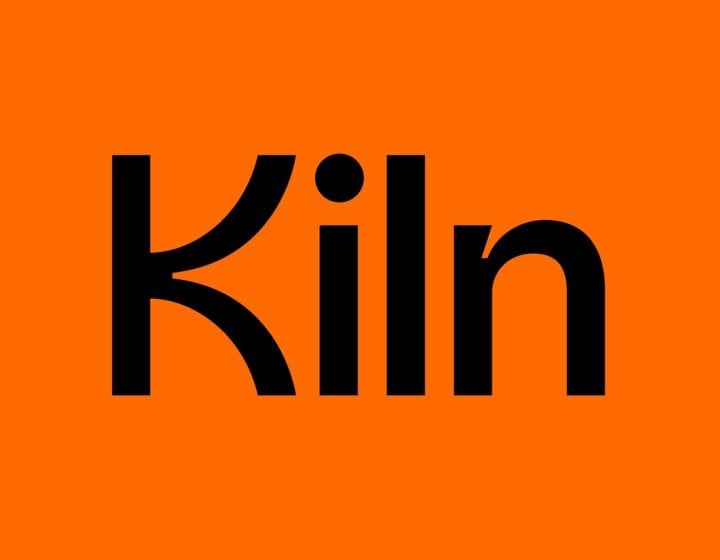
Studio Kiln: the Falmouth alumni with global clients
25 April 2025
Nathan Smith and Charlie Hocking met by chance in a shared workspace and quickly realised they had a...

Studio Kiln: the Falmouth alumni with global clients
25 April 2025
Nathan Smith and Charlie Hocking met by chance in a shared workspace and quickly realised they had a...

Journalism student lands new role with London Daily News
23 April 2025
Maisie Milward’s enthusiasm for writing has led to her securing work as a writer for London Daily ...

Embarking on a new academic adventure as a mature student
22 April 2025
Hello curious readers and future students! As a mature student stepping back into the academic world...
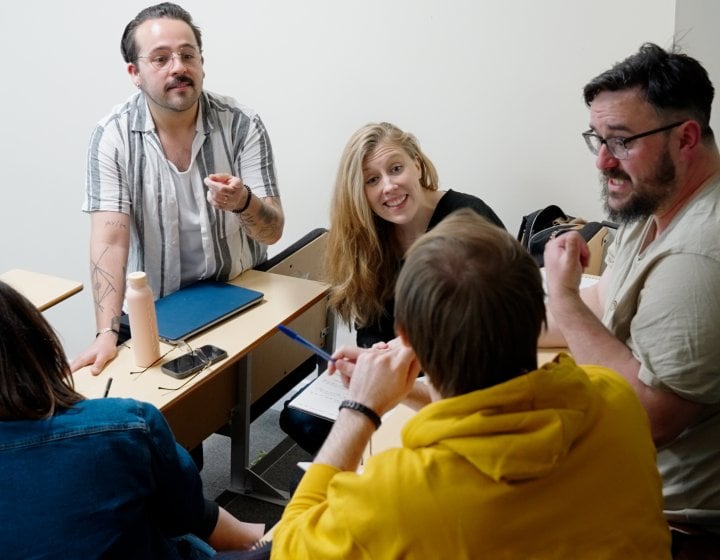
Meet our online Screenwriters
17 April 2025
Falmouth's established Writing for Script & Screen MA (Online) course has garnered a passionate and ...
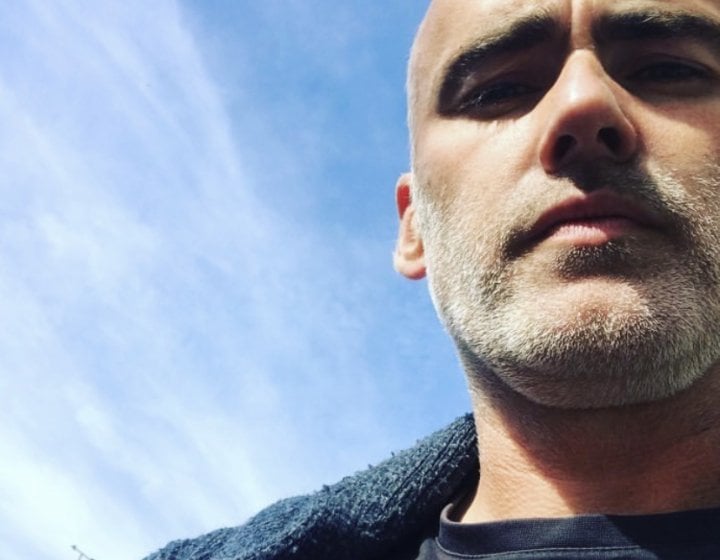
Studying online as a working parent
14 April 2025
Hi, my name is David and I’m currently studying an online degree in Creative Writing.
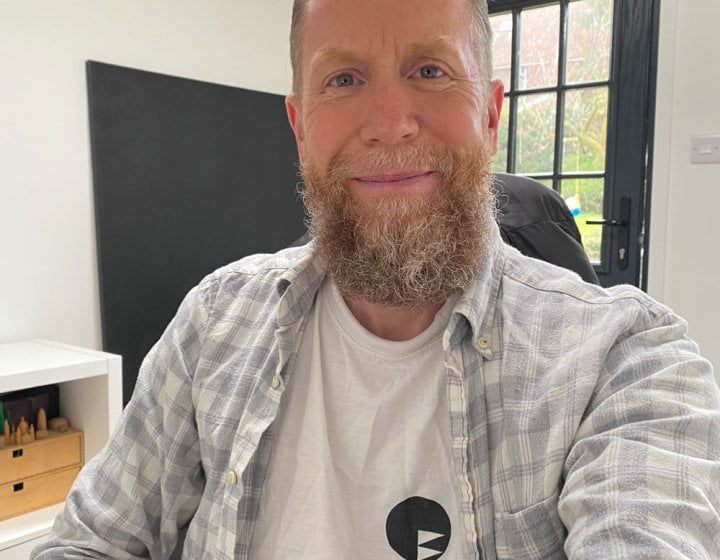
Simeon Berends on a career shaped by curiosity
01 April 2025
When Simeon Berends walked through the doors of a local radio station as a teenager, he was hoping f...

“Have a strong idea at the heart of every creative project,” says James Flint
25 March 2025
After graduating from the Graphic Design BA(Hons) in 2012, James Flint got a lucky break as an inter...

Illustration graduate redraws future in games industry
14 March 2025
Originally enrolled in Falmouth’s Illustration BA(Hons) course, Thomas soon realised that his pass...

Exploring the Future of Gaming with Ryan Norrington
14 March 2025
We’re excited to welcome Ryan Norrington, Creative Director at Metavision, as a guest speaker for ...
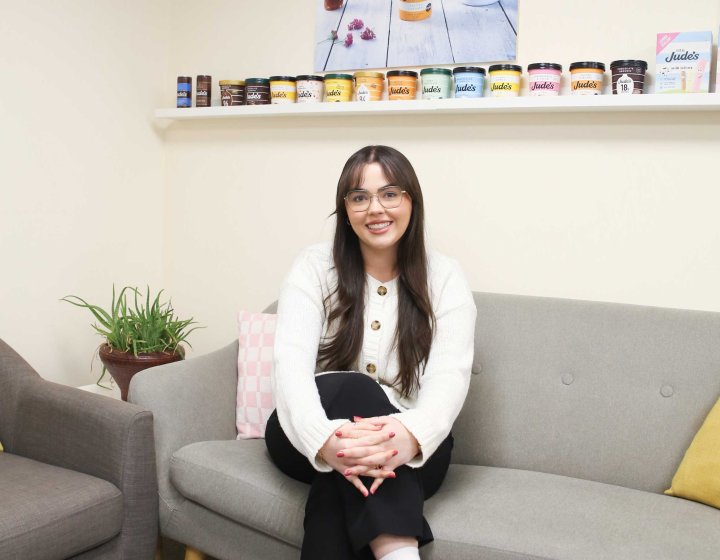
Graduate Spotlight: Charly Richards, Associate Brand Manager at Jude’s Ice Cream
24 February 2025
For Marketing and Digital Communications MA (Online) graduate Charly Richards, her dedication to lea...
How you'll learn & be assessed
On this Creative Writing degree, you'll work on live briefs set by creative industry partners, and learn from lectures and workshops with our guest speakers and Writers in Residence.
On top of your regular lectures, seminars, workshops and self-directed learning, you'll get plenty of time with our staff and the chance for frequent one-to-one tutorials. You'll also have the opportunity to contribute to our student writing journal.
At Falmouth, we use a 'digitally enhanced learning & teaching' approach. Your experience will always be predominantly in-person, including seminars, tutorials and studio teaching, with some, more targeted elements, being online either live (synchronous) or pre-recorded (asynchronous). You can read more here.
100% of your assessment will be coursework.
Assessment methods
- Coursework and e-learning exercises.
- Live creative industry briefs.
- Final-year creative writing portfolio.
This course could be for you if...
- You love creative writing!
- You're looking to build upon your natural writing skills
- You want to develop your creative voice
- You enjoy learning about literature's role in the past and present
- You've got a passion for and interest in writing as part of the creative industries
- You want to use your ability to write creatively in your future career
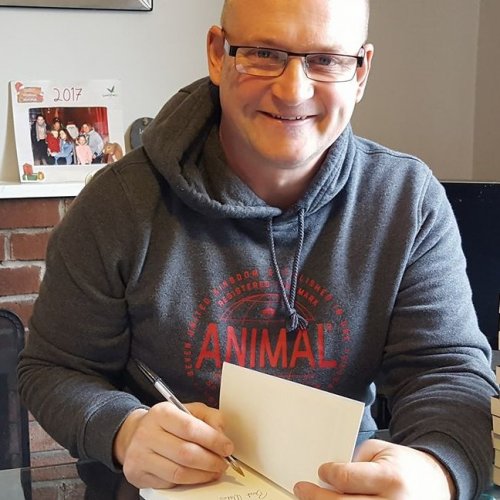
Meet the accidental author juggling multiple book deals
Graduate Adrian Martin has just published his second book Stone Ruins and City Smoke and is currently signed to two deals with Dark Edge Press and Spellbound Books - find out Falmouth's creative community helped him do it.
Read Adrian's storyStaff
You'll be taught by published writers and academics from fields like screenwriting, radio, theatre, contemporary poetry, digital texts, writing for games, writing and environment, fiction and non-fiction, publishing and print culture, and children's and young adult writing.
Some members of staff only teach on specific modules, and your course might not feature every staff member who teaches on the course.
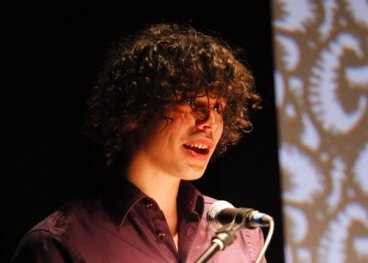
Dr David Devanny
Associate Professor Multimedia Writing & Storytelling
David is an Associate Professor and acting Head of Subject for Writing and Journalism at Falmouth Un...
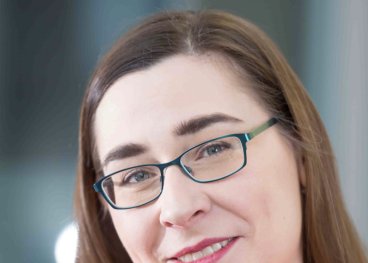
Dr Jennifer Young
Head of People Success
Jennifer Young came to Falmouth in 2019 to take up the post of Head of Writing and Journalism. She o...

Dr Luke Thompson
Course Leader, MA Professional Writing
Luke is a writer and publisher from Cornwall. His interests include human-animal relationships, smal...
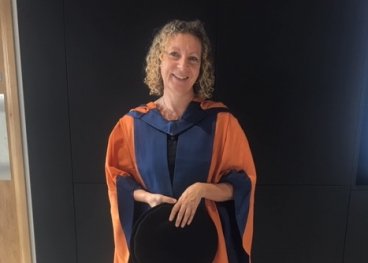
Professor Ruth Heholt
Professor of Literature and Culture
Ruth Heholt is an internationally renowned scholar in the fields of Gothic, supernatural, Victorian,...

Dr John Finnegan
Course Leader, MA Writing for Script & Screen
John has worked in the film and media sector for twenty years. He started his career a...

Rupert Loydell
Senior Lecturer, English & Writing
Rupert Loydell is Senior Lecturer in the School of Writing and Journalism at Falmouth University, th...

Dr Eoin Murray
Lecturer, Creative Writing BA(Hons)
Eoin Murray is a Welsh writer, game scripter, and ludo-narratologist from Bangor in North Wales curr...

Dr Marshall Moore
Course Leader and Senior Lecturer
Dr. Marshall Moore hails from North Carolina and relocated to the UK in 2020 after living and workin...
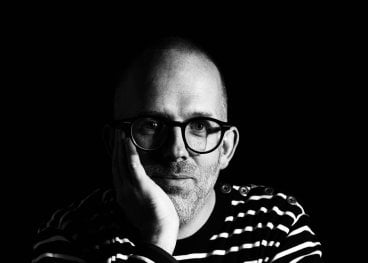
Wyl Menmuir
Lecturer, Creative Writing
Wyl Menmuir is an award-winning author based in Cornwall. His 2016 debut novel, The Many was longlis...
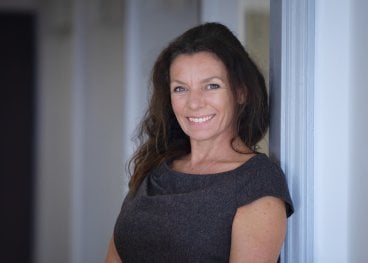
Nicola Coplin
Lecturer
Nic has taught at Falmouth University since 2013. She trained in acting at the Hub Theatre School in...
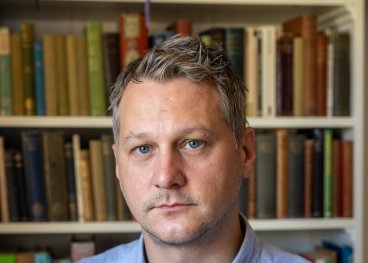
Dr Adrian Markle
Senior Lecturer in Creative Writing
Adrian joined Falmouth in 2019. Originally from Canada, he moved to the UK in 2011 for the MA at Bat...
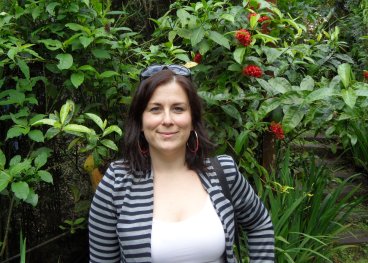
Dr Jo Parsons
Lecturer in English and Creative Writing
Dr Jo Parsons has been a Lecturer in English and Creative Writing at Falmouth University since 2019....

Craig Barr-Green
Lecturer, Creative Writing BA(Hons)
Craig Barr-Green writes for page, stage and screen. In 2010 he set up Clickety Books, creating resou...
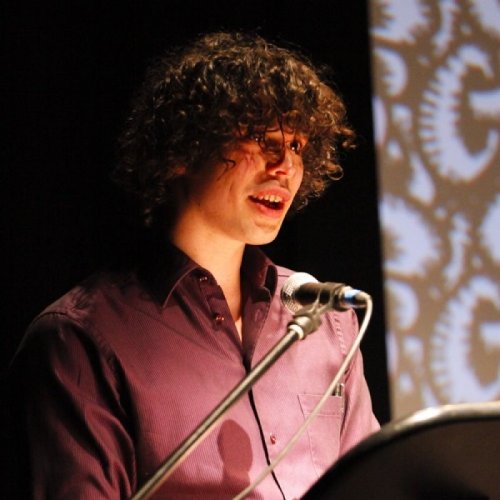
Got a question about this course?
If you want to know more about the course structure, our application requirements or what our graduates have gone on to achieve, our friendly course team is here to help.
Chat to David
Lecturer Kit Chapman's Top 5 Writing Tips
Lecturer Kit Chapman (who happens to be an award-winning journalist), tells us his top five creative writing exercises used with Falmouth University students. Get a taste of how we'll help you break out of your Monday morning mindset at uni and bring your imagination roaring to life!
Read Kit's tips
Facilities
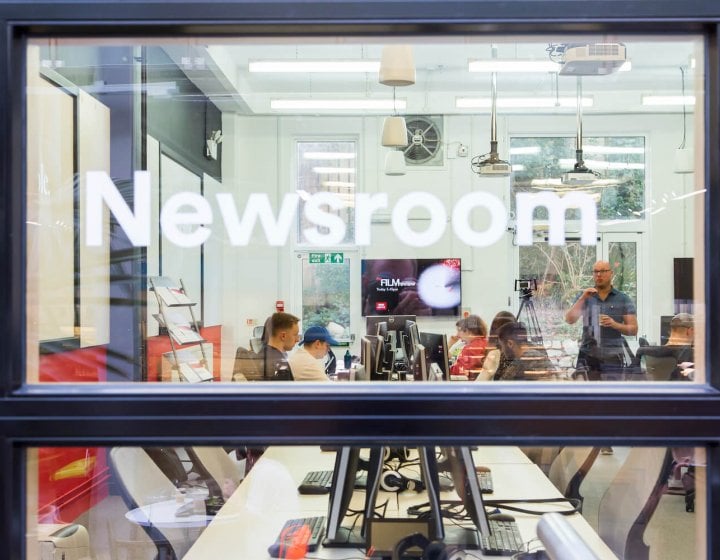
Media Equipment and Facilities
Our industry-level facilities offer everything you need to practice and produce animation, film, TV,...
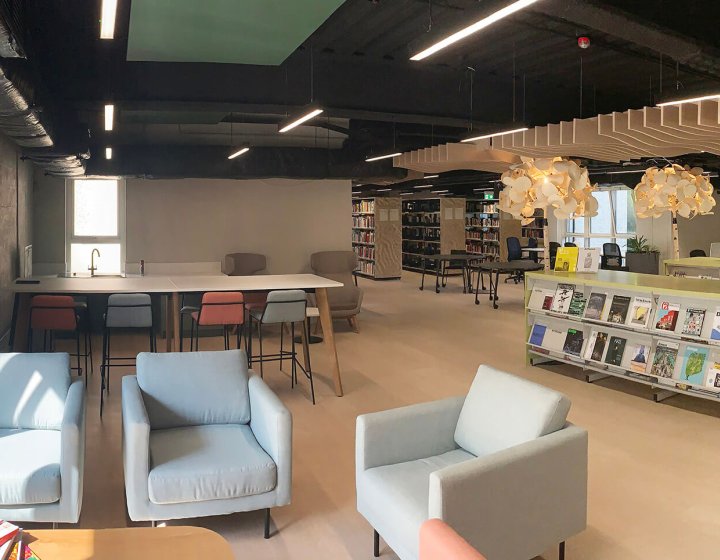
Library Facilities
Offering extensive collections, our two libraries provide a wealth of digital resources, magazines, ...

Sports Centre
Our Sports Centre, on Penryn Campus, includes a spacious gym with up to 90 of the latest, new statio...
- Digital labs, lecture theatres and seminar rooms.
- Libraries housing 140,000 books, 17,000 DVD and video titles, and exhaustive electronic and journal resources.
- Printmaking studio with a range of printmaking techniques from screen-printing to lithography and monotyping.
- Digital printing and reprographics.
- The Lighthouse: a beautifully appointed room designed to be a social space for students and alumni to meet, collaborate and relax.
- The Shed is a space designed for focused, individual work for writing and journalism students.
- IT suites and technical workshops for Adobe InDesign and other digital tools.
- Extensive library facilities, including archive and special collections, specialist poetry collections, the Cornish Performance Archives, Chris Brooks Collection of Victorian Culture, and Patrick Gale author archive.
- The Soundhouse hosts state of the art audio recording and editing facilities. Specialist technical support is provided.
Careers
Our Creative Writing graduates have worked as:
- Authors
- Lecturers
- Director at Bristol Old Vic Young Company
- Web Content Editor at TorFX, Cornwall
- Creative Developer at Brand Institute, Miami
With businesses growing their online presence, talented writers are being hired as copywriters, web editors, PR officers and content creators to help brands communicate.
How to apply
Ready to apply for 2025?
You can apply for our undergraduate degrees via UCAS. You'll need our university UCAS code (F33) as well as your course code (which you'll find on your course page) for your application.
| Course route | UCAS code |
|---|---|
| Creative Writing BA(Hons) three year degree | W890 |
| Creative Writing BA(Hons) with professional placement | PY45 |
For starting your studies in 2025
UK applications: 29 January 2025 (for equal consideration)
Applications after the 29 January will be considered on a first-come, first-served as long as there are places available. Apply for this course now.
International fee payers
International fee payers can apply throughout the year. But we recommend applying as early as possible, to make time for visa and travel arrangements.
We consider all applications on their own individual merit and potential. We invite all applicants to an interview day or audition to give them the opportunity to demonstrate this along with what inspires and motivates them in their field. Applicants will also be able to show their portfolio or give a performance depending on the course. We welcome applications from all subject backgrounds, whether you’ve specialised in STEM, the arts or humanities.
Course routes & entry requirements
BA/BSc(Hons) three year degree: 104 – 120 UCAS Tariff points
BA/BSc(Hons) four year degree with professional placement: 104 – 120 UCAS Tariff points
Check the title of your course to see if it's a BA or BSc award. UCAS Tariff points will primarily be from Level 3 qualifications such as but not limited to A-levels, T Levels, a BTEC/UAL Extended Diploma or a Foundation Diploma.
For applicants whose first language is English we require you to have or be working towards GCSE English Language Grade 4 (C), or equivalent.
If English is not your first language you will need to meet the same standard which is equivalent to the IELTS Academic 6.0 overall score, with at least 5.5 in Reading, Writing, Speaking and Listening. We accept a range of in country equivalencies and approved tests.
If you need a student visa to study in the UK, you may need to take a recognised language test. You can read our English Language Requirements for more information.
Fees, costs & funding
Tuition fees
| Annual tuition fee | Student |
|---|---|
| £9,535 per year | Full-time UK |
| £17,950 per year | Full-time EU/international |
| £1,905 per professional placement year | Full-time UK and EU/international |
| Annual tuition fee | Student |
|---|---|
| £9,250 per year | Full-time UK |
| £17,950 per year | Full-time EU/international |
| £1,850 per professional placement year | Full-time UK and EU/international |
Tuition fees for September 2026 will be confirmed in summer 2025.
Tuition fees are set annually and are subject to review each year. The University may therefore raise tuition fees in the second or subsequent years of a course, in line with inflation and/or the maximum permitted by law or Government policy. Students will be notified of any changes as soon as possible.
The figures above don't include accommodation and living costs
Typical course costs
- £300 - £400 - Recurring annual costs
- £500 - Optional study visits and placements for the course duration
You do not need any specific software, but a reasonable home or work computer and standard wifi will be required for this course.
If you need to bring equipment or materials with you, these will be outlined in your Welcome Letter.
Funding
For information about funding available, please visit our student funding pages.
Ask a student
What better way to find out about life at Falmouth University than by asking our current students?
From course details and academic support, to the social scene and settling in, our students are ready and available to answer any questions you might have. Simply set up your account, send them a question and they'll get back to you within 24 hours.
Similar courses
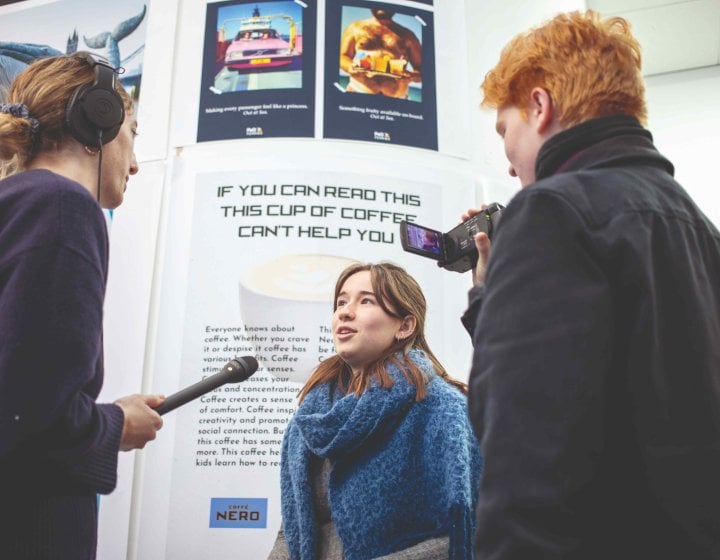
Media BA(Hons)
Today’s fast-paced media landscape is calling out for brave and flexible storytellers. On this Med...
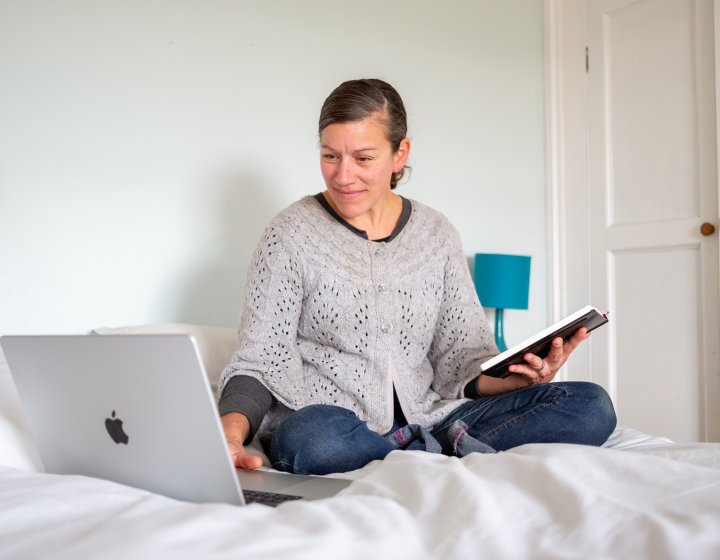
Creative Writing BA(Hons) (Online)
Whether you dream of penning novels, writing for games, creating compelling digital campaigns or wri...

Journalism & Creative Writing BA(Hons)
Kick-start your career as a writer, learning how to analyse, practise and publish all forms of journ...
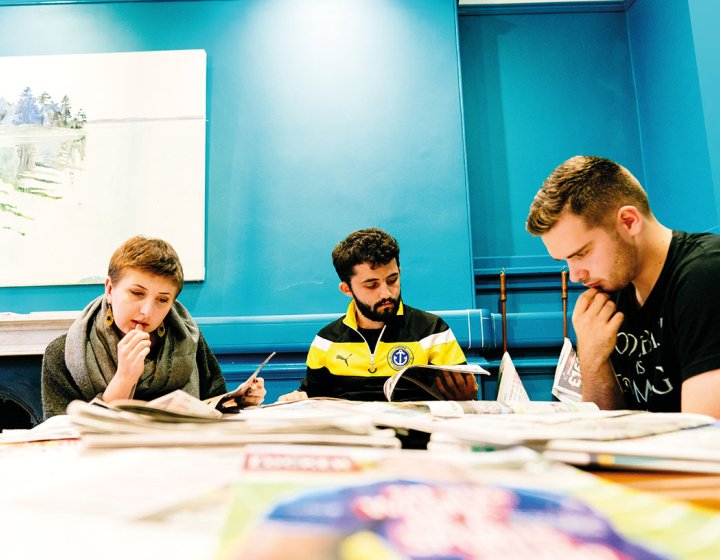
English & Creative Writing BA(Hons)
Join a celebration of literature and writing. You’ll read critically and widely, learning about hi...
Open Days and events
From visiting campus to online application advice, get all the information you need about joining our creative community.
Find an event